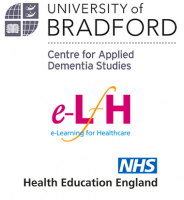Enabling People to Live Well with Dementia | Pharmacological Interventions in Dementia Care



This session will investigate the most common medications prescribed for people living with dementia, including their risks and benefits and the importance of regular recorded reviews.
Learning Objectives
By the end of this session you will be able to:
- List the most common medications prescribed for people living with dementia
- Describe the main risks and benefits of using a range of anti-psychotics, antidepressants, anxiolytics, anticonvulsants and cognitive enhancers
- Recognise issues with regards to polypharmacy for people living with dementia
- Explain the importance of recording and reporting side-effects and/or adverse reactions to medication
- Describe how to administer and review medication safely and appropriately in consultation with people affected by dementia
This session will investigate the most common medications prescribed for people living with dementia, including their risks and benefits and the importance of regular recorded reviews.
This session has been mapped to the Dementia Training Standards Framework and is designed to support the Dementia Action Alliance Dementia Statements.
Before commencing this session you may wish to complete:
- Module 1 – Introduction to Living with Dementia/Dementia Awareness (407-0030)
Hadar is a Senior Lecture in Pharmacy at the University of Bradford and has worked at various NHS Mental Health service providers in his career. Hadar is currently the lead Pharmacist for Medicine Safety for one of the largest third sector organisations providing mental health services in the North West of England.
Hadar has a varied research background and has undertaken several systematic reviews which have been used to inform clinical guideline development nationally and internationally. Hadar, through his experience and practice, provides specialist professional and clinical advice to the Care Quality Commission and regularly participates in inspections. Hadar has worked on expert advisory groups for the Medicines and Healthcare products Regulatory Agency and is a member of The National Institute for Health and Care Excellence serving in the Centre for Guideline Development.



- Step to Work | Systems that shape everyday practic...
- Posted By eIntegrity Healthcare e-Learning
- Posted Date: 2024-12-23
- Location:Online
- This session looks at how the everyday practice of allied health professionals is part of, and shaped by, complex systems.
- Step to Work | Sustaining change and learning
- Posted By eIntegrity Healthcare e-Learning
- Posted Date: 2024-12-23
- Location:Online
- In this session, we will help you begin to draw together some of your reflections and learning from the Step to Work programme. We will be drawing on some ideas from positive psychology to help you do this.
- Step to Work | Positive appraisal of learning duri...
- Posted By eIntegrity Healthcare e-Learning
- Posted Date: 2024-12-23
- Location:Online
- This session focuses on appraising your experiences in service settings to help you surface and understand the thoughts and feelings1 about difficult and challenging situations you have experienced. It will also help you to better appreciate your own stre
- Step to Work | Personal wellbeing at work
- Posted By eIntegrity Healthcare e-Learning
- Posted Date: 2024-12-23
- Location:Online
- This session explores how we can use self-care practices to help overcome the negative impacts that challenging days at work have on us and promote health and wellbeing.
- Step to Work | Introduction to the sessions in the...
- Posted By eIntegrity Healthcare e-Learning
- Posted Date: 2024-12-23
- Location:Online
- Introdcution to the sessions in the Step to Work programmme.






